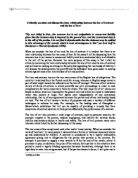interest to enforce a contract where it is just and reasonable to do so, but courts have traditionally had greater difficulty in imposing a duty of care in tort.
CP01-5752
In English law, it has been established that it is perfectly possible for a defendant to owe concurrent duties in contract and tort, although a claimant will not receive damages twice over. This is not to say that he will be denied a remedy in tort if he cannot establish a breach of contract, for although duty in tort is owed to persons generally, duty in contract is to specific persons, and so the presence of breach of contract does not entail a breach of a general duty of care. A duty not to commit tortious acts (after Donoghue -v- Stevenson2) cannot be analogous with a duty not to breach a contract, so it follows that other factors must be considered, such as privity, proximity and reasonable foreseeability. A persuasive judgment on this issue was handed down by Le Dain J in Central Trust Co. -v- Rafuse3: “...a concurrent or alternative liability in tort will not be admitted if its effect would be to permit the plaintiff to circumvent or escape exclusion of limitation of liability for an act or omission which would constitute a tort.” The House of Lords decided this was the case in Henderson -v- Merrett Syndicates Ltd.4 where Lloyd’s names were able to bring action in tort against member’s agents for negligence, although a contract also existed between the parties. It can therefore be shown that the duty to take care in tort law is of the same standard required in performing a contract carefully, although tort implies a much wider scope of duty than may be stipulated in contract. This represents a swing in precedence in favour of claimants, totally contrary to Lord Scarman’s decision in Tai Hing Cotton Mill Ltd. -v- Liu Chong Hing Bank Ltd5. where there was “...no advantage in searching for liability in tort where the parties are in a contractual relationship.”
In deciding whether bringing action in tort or contract is likely to be the most successful, the claimant must consider the necessary criteria to satisfy each. To establish a basis for contractual remedies, it must be shown that the defendant breached the express or implied terms of the contract, and the claimant suffered loss as a result. The most obvious obstacle with this course of action is establishing the existence of a contract; if none can be found, there can be no duty and hence no breach of that duty. However, due to the express terms of a contract, liability may be easier to prove on the balance of probabilities than in tort. In some circumstances, more success may be found by bringing action in tort. The necessary requirements are the claimant’s showing they were owed a duty by the defendant, that the defendant failed to fulfil the required standard of care, and that this failure caused loss or damage to the claimant.
The ratio of Henderson and Central Trust suggest that claims may be brought in one of the two
headers, but this does not mean a defendant is not liable under the other. He may be liable in both. By virtue of this, suing for damages in breach of contract should not alter the liability in tort, although this
CP01-5752
is not always true. One problem with this exhaustive approach is that all breaches of contract may constitute a tort, so a defendant finds it almost impossible to escape liability. This was the concern in Junior Books -v- Veitchi Co. Ltd.6, and since this decision the courts have attempted to construe the distinction of duties more narrowly, such that if a defendant’s liability for breach of contract can be shown, there is no need to establish liability in tort also. This shows the courts’ reluctance to dilute the essentials of contract law, by attributing and reinforcing the idea that contracting individuals enter into such a relationship freely by negotiating agreed terms.. It is reasonable, for anyone suing in contract would be doing so for breach of a duty particular to him - in this way, tort obligations are superfluous, as contract terms take precedence.
The role of tort is thus of more use when a third party wishes to claim, i.e. someone who is not contractually bound, but is affected by the terms or results of the contract he is not a party to. It is quite permissible for claimants to sue defendants in negligence in respect of the latter’s role as promisor. The doctrine of privity holds that one who is not party to a contract cam have no rights or obligations under it, although the Contracts (Rights of Third Parties) Act 1998 amended this position somewhat, and provided individuals not in a contractual relationship with the ability to sue upon a particular contract if: a) the contract states they may do so, and b) the contract was for their benefit. The first criterion would seem problematic, although further analysis shows this is not so: if the third party is unable to find a clause permitting them to sue for breach, they might still be able to sue in negligence. The question is whether the Act brings third party rights under scope of contract (and remedies) or applies principles of tort to contractual obligations.
For third party litigants, the Act should be approached with caution, since courts are traditionally reluctant to extend contractual remedies to those not privy to a contract, and success depends on the intentions of the contracting parties to create a legally enforceable obligation, such as a trust. In White -v- Jones7, the facts were very similar to Ross, except here the solicitor’s negligence took the form of unreasonable delay in drawing up a will as instructed. The testator was reconciled with his estranged daughters, and instructed a new will to be drawn up in which they were to receive £9000 each. He died before this was achieved. The daughters sued successfully in tort. It seems fair that C should only be able to sue if the breached contract between A and B was for C’s benefit. To extend privity wider than this would be to make would-be defendants liable to at least the reasonably foreseeable victim (if not the world at large) for potential breaches of contract - the duty of care owed would encompass anyone who just happened to benefit from the contract between A and B. In Caparo -v- Dickman8 Lord Bridge
remarked this would be to: ...“confer on the world at large a quite unwarranted entitlement to appropriate for their own purposes the benefit of expert knowledge or professional experience
CP01-5752
attributed to the maker of that statement” as the defendants carrying out the audit owed a duty of care in contract to the company and individual shareholders, but not to shareholders collectively. However, it is vital that a right of action exists for a third party beneficiary to enforce or sue on a breach, otherwise they would be forced to rely on the goodwill (or otherwise) of contracting parties to fulfil their obligations in respect of C.
One solution to the problem of a claimant’s specific identity is the discovery of a collateral contract, as in Shanklin Pier -v- Detel Products.9 Here the defendant was held to have a collateral contract with the claimant, because ’but for’ the defendant’s assurances, the claimant would never have entered into the main contract to purchase paint. As a result of this, contractual remedies were allowed, although the usual tort defences were permitted.
It is interesting to speculate on how successful such defences would be if employed against a breach of contract. The Law Reform (Contributory Negligence) Act 1945 introduced rules pertaining to contributory negligence, although by virtue of statutory definition only applied to tort and not contract. However, Forsikringsaktieselskapet Vesta -v- Butcher10 held that it did. In this case, the contractual obligations between the parties were not sufficiently determined, so the court applied the standard of care that would be applicable in tort. The claimant is responsible for taking reasonable steps to ensure their own safety. In this way, a duty of care is extended to contracts, where the duty to perform a contract adequately runs parallel to a duty to take reasonable care towards the claimant, although it must be clarified that the two duties are not intended to be analogous although they do co-exist. Lord Goff highlighted in Henderson that unless a contract explicitly included a term to waive the right to sue in tort, damages were obtainable in either contract or tort, provided the term introduces a different standard of care than that which is generally applied. So for example in Barclays Bank -v- Fairclough Building Co.11, the duty owed was very narrow, as it was defined in the contract. Where a contract imposes strict liability or specifically states the standard of care to be applied, contributory negligence cannot be practically applicable in defence, and so a claim in tort would probably be more successful.
The tort of negligence relies upon the existence of a duty of care between a claimant and a defendant. In situations of conflict the courts will ultimately decide whether imposing such a duty of fair, just and reasonable, and to do this requires consideration of numerous factors, including whether parties may or
may not be contractually bound. Remedies in tort are intended to compensate for harm done, whilst in contract are designed to compensate for the failure of the other party to fulfil his promise, and can include rescission - not available in tort. In Livingstone -v- Rawyards Coal Co12. it was held: “the
CP01-5752
measure of damages is that sum of money which will put the party who has been injured, or who has suffered, in the same position as he would have been had he not sustained the wrong...”. This can be contrasted with the common law attitude that where a party incurs loss through breach of contract he is to be placed in the position that he would have been in had the contract been adequately performed rather than had it not existed at all (Robinson -v- Harman13). This reflects the notion that freely undertaking parties should expect to be bound by their intentions, whereas in tort the injured person would have had no such intention.
It would seem that contract and tort law are fundamentally exclusive, although they may be reconciled to a certain extent. I am inclined to agree with Lord Goff, who wrote:14 “the result may be untidy; but, given that the tortious duty is imposed by the general law, and the contractual duty is attributable to the will of the parties, I do not find it objectionable that the claimant may be entitle to take advantage of the remedy which is more advantageous to him”.
1 Ross -v- Caunters [1980] Ch.297
2 Donoghue -v- Stevenson [1932] AC 562
3 Central Trust Co. -v- Rafuse (1986) 31 DLR (4th) 481
4 Henderson -v- Merrett Syndicates [1994] 3 All ER 506
5 Tai Hing Cotton Mill Ltd. -v- Liu Chong Hing Bank Ltd [1985] 2 All ER 947 at 957
6 Junior Books Ltd. -v- Veitchi Co. Ltd. [1983] 1 AC 520; 2 All ER 201
7 White -v- Jones [1993] 3 WLR 730
8 Caparo Industries plc. -v- Dickman [1990] 2 AC 605 at 633
9 Shanklin Pier -v- Detel Products Ltd. [1951] 2 KB 854
10 Forsikringsaktieselkapet Vesta -v- Butcher [1988] 3 WLR 565
11 Barclays Bank -v- Fairclough Building Ltd. [1995] QB 214
12 Livingstone -v- Rawyards Coal Co. (1880) 5 App.Cas 25 at 39
13 Robinson -v- Harman (1848) 1 Exch. 850
14 [1995] 2 AC 145 at 194
??
??
??
??
1







